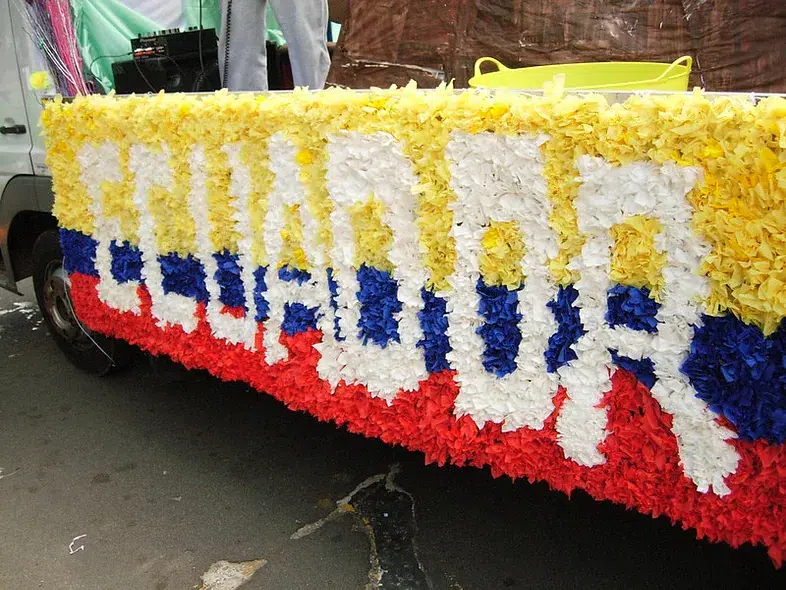
Tricolor banner with the name Ecuador. Photo: Adrian, acediscovery/Flickr (CC).

Orinoco Tribune – News and opinion pieces about Venezuela and beyond
From Venezuela and made by Venezuelan Chavistas

Tricolor banner with the name Ecuador. Photo: Adrian, acediscovery/Flickr (CC).
By Peter Bolton – Aug 23, 2023
On August 20, Ecuadorians went to the polls to elect a new president just over two years since the previous presidential elections of 2021. Luisa González of the Citizens’ Revolution party topped the poll with 33%. But since no candidate achieved the necessary threshold to win in the first round, the election will now be decided via a run-off election in October. She will face political newcomer Daniel Noboa of the center-right National Democratic Action Party, who surprised political observers by placing second in a crowded field with 24% of votes counted.
González’s party was founded by former firebrand socialist president Rafael Correa after his original party, Country Alliance, became sullied by his successor Lenin Moreno. After serving as Correa’s vice president and then getting elected as his heir apparent, Moreno betrayed his own party and the mandate he had been given from his voters by moving markedly to the right once in power. This included imposing a crushing austerity agreement with the Washington-based International Monetary Fund (IMF) and even persecuting former comrades. Correa himself, for instance, has been living in exile in Belgium following a lawfare campaign against him, based on trumped-up campaign finance violations, that was launched during the presidency of his erstwhile protégé. Moreno left office with the lowest approval rating in modern Ecuadorian history and consequently declined to run after his first term in office despite being eligible.
The South American nation’s presidential elections were originally scheduled for 2025. But this year’s snap poll was initiated after President Guillermo Lasso invoked a constitutional provision known as “muerte cruzada,” which dissolves the National Assembly and triggers fresh legislative and presidential elections. Lasso, a former banker who represents the right-wing CREO party, was facing impeachment proceedings on various corruption and embezzlement charges and, upon his de facto resignation, had a public approval rating of below 15%. It appears that he invoked the measure to avoid the public embarrassment of impeachment and likely conviction.
Lasso had become president after having narrowly beaten socialist rival Andres Arauz, also of Correa’s Citizens’ Revolution and González’s current vice-presidential running mate, in the 2021 presidential election. Lasso’s victory surprised observers given that he barely made it into the run-off following a strong finish for self-proclaimed “eco-socialist” Yaku Pérez, who almost beat him into third place. As the run-off election nears, there is great risk that history will repeat itself. As happened in 2021, the Citizens Revolution Movement is at risk of narrowly losing in spite of having topped the first poll.
The right/pseudo-left alliance
Central to the Citizens’ Revolution’s loss in 2021 was the electoral alliance between Lasso and Yaku Pérez. Pérez is an Indigenous Ecuadorian and had built a substantial following amongst this long-marginalized constituency. He bills himself as an “eco-socialist” and has a record of opposing extraction of natural resources. However, serious doubt has been cast upon both his domestic progressive credentials and his willingness to oppose US intervention into Latin America.
During the Moreno presidency, for instance, he opposed the distribution of coronavirus support payments and expressed willingness to support a free trade agreement with the US. There are also credible reports that Pérez’s Pachakutik party has received funding from CIA regime-change front groups such as the National Endowment for Democracy (NED). It wouldn’t be going too far to describe him as a closet neoliberal and, based on his public statements, he seemingly has a deep-seated hatred for Correa’s political faction and its record in government. Worse still, he supported the 2019 US-backed coup in Bolivia against the democratically elected president, Indigenous leader and former coca farmer Evo Morales.
In a bizarre case of political bedfellows, Pérez even supported Lasso when he was a candidate in the 2017 presidential election. The two ultimately entered into a quid pro quo in 2021 and pledged to support whichever of them reached the run-off against the Citizens’ Revolution candidate. This essentially delivered Pérez’s substantial Indigenous (and presumably left-leaning) support base to Lasso, which ultimately handed him the election.
Given that anti-extractivism forms a core part of his public image and appeal, in this year’s election Pérez’s support had possibly been neutralized by the inclusion of a binding plebiscite that asked voters whether they support the halting of oil drilling in a biodiverse corner of the country’s Amazon region. The referendum passed with roughly 60% of Ecuadorians backing the ban. But to avoid history repeating itself by allowing Pérez’s followers again to be led into the open arms of the Citizens’ Revolution’s right-wing opponent, González must rebuild bridges with the country’s Indigenous population. Admittedly during the Correa presidency some of the movements representing this community were not held as firmly within the governing coalition as they could and should have been. Only by assuring these movements that this will not happen again can the left overcome this obstacle and win back this constituency.
Public disaffection with right-wing corruption
Former President Lasso’s ignominious fall from grace, meanwhile, should work to the Citizens’ Revolution’s advantage if González stays on message. Though Noboa is not of the same party as Lasso, he is nonetheless part of the same traditional Ecuadorian oligarchy. He is also a US citizen and spent part of his childhood in the States. His father, meanwhile, is a powerful figure in Ecuador’s lucrative banana industry and one of the wealthiest people in the country. The senior Noboa himself ran for the presidency on five separate occasions, all unsuccessfully.
Moreover, the younger Noboa has already been marred in accusations of similar improprieties to those of Lasso. Democracy Now! reported that he “has been accused of multiple tax and labor violations.” Given the fate that ultimately befell Lasso, these allegations along with his ties to the business world and the hegemon to the north could work to González’s benefit.
Rising crime and drug problems
Public concern over recent increases in violence throughout the country may also help the Citizens’ Revolution. The New York Times reported earlier this month that “local prison and street gangs, along with foreign drug mafias, have unleashed a wave of violence unlike anything in the country’s recent history, sending homicide rates to record levels and hurting the vital tourism industry.” The violence ultimately spilled over into the election itself with three political leaders being killed during campaigning, including presidential candidate Fernando Villavicencio.
There is reason to believe that policies enacted under the Moreno and Lasso governments are at least partly to blame for this rise in violence. And indeed, they appear to have undone what was one of Correa’s strongest achievements while he was president. As Joe Emersberger pointed out at People’s World in March 2023:
Ecuador experienced a dramatic and unprecedented two-thirds reduction in its homicide rate during Correa’s years in office (January 2007-May 2017). The homicide rate then increased, just as dramatically, after Correa left office and rightwing governments took over. … The homicide rate increased to 25.9 per 100,000 in 2022 according to InSight Crime — a historic high for Ecuador. When Correa left office in 2017 it was 5.8 per 100,000, one of the lowest in Latin America. It is now among the highest.
This connection between neoliberalism and crime rates seems to have played out elsewhere in the region, particularly in Central America.
There is, of course, a perception throughout Latin America that the left is soft on crime and Noboa might draw from this playbook. González must push back against this narrative and double down on articulating the causal relationship between rising crime and neoliberalism that has played out both at home and throughout the rest of Latin America.
Failure of neoliberalism more broadly
Perhaps the biggest factor working in the Citizens’ Revolution’s favor is the failure of neoliberalism in Ecuador, and indeed across the region, more broadly. After four years of Moreno and two years of Lasso, Ecuadorians have lived under a combined six years of neoliberal policies and all of its usual pathologies. In 2020, for example, poverty in Ecuador increased by almost 5% following previous increases in the two preceding years.
In October 2022, Irene León and Jose Agualsaca pointed out at the Latin American Information Agency that “the imposition of a radical neoliberalism brings with it the destruction of a sovereignty project, constitutionally based (2008) on a perspective of the common good and the public.” They add:
transnational corporations have been repositioned in strategic sectors, while the prescriptions of the International Financial Institutions, especially the International Monetary Fund (IMF), have supplanted the Constitution. State assets and resources are being auctioned off, while security and defense are being transferred to foreign repressive models.
Noboa appears likely to continue this legacy should he be elected. Though he has spent only a few years as a legislator in the National Assembly, he has in that short time built a record as a reliable supporter of neoliberal orthodoxy. The New York Times, for instance, reported that during his time in the assembly he has “supported bills to attract international investment and cut taxes.”
The specter of complacency
For all of the above factors working in their favor, the Citizens’ Revolution does not have cause to be complacent. The stakes are too high to repeat the 2021 election defeat, which led to two more years of neoliberalism under the disastrous Lasso presidency. The youth vote appears to be up for grabs with reports that some young Ecuadorians are looking for something different from both the Lasso/Moreno years and the Correa years. This could benefit the youthful and relatively unknown Noboa, though González is also a relative political newcomer, and her running mate Andrés Arauz is about the same age as Noboa.
González must walk the fine line between rallying her base while simultaneously appealing to the undecideds. To do the former, she must make clear commitments to reinvigorate Correa’s revolution, safeguard his constitutional reforms, and reiterate her party’s opposition to plundering by multinational corporations and interference from the Washington-based international organizations. To do the latter, she must communicate fresh ideas and promise a decisive break from the past. Crucially, she must work to reincorporate the Pérez-supporting sections of the Indigenous community back into the Citizens’ Revolution’s fold.
(Medium)

Peter Bolton is a Journalist at RT, The Canary and Counterpunch | (mostly democratic) socialist | anti-corporate & pro-environment |